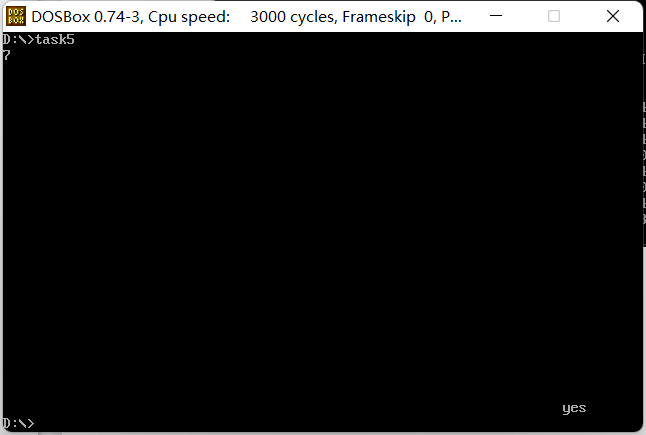实验四
任务一
assume cs:code, ds:data data segment x dw 1020h, 2240h, 9522h, 5060h, 3359h, 6652h, 2530h, 7031h y dw 3210h, 5510h, 6066h, 5121h, 8801h, 6210h, 7119h, 3912h data ends code segment start: mov ax, data mov ds, ax mov si, offset x mov di, offset y call add128 mov ah, 4ch int 21h add128: push ax push cx push si push di sub ax, ax mov cx, 8 s: mov ax, [si] adc ax, [di] mov [si], ax inc si inc si inc di inc di loop s pop di pop si pop cx pop ax ret code ends
回答问题
1.不能,因为inc不会改变进位标志位CF,但是add可以改变进位标志位
2.


任务二
assume cs:code, ds:data data segment str db 80 dup(?) data ends code segment start: mov ax, data mov ds, ax mov si, 0 s1: mov ah, 1 int 21h mov [si], al cmp al, '#' je next inc si jmp s1 next: mov ah, 2 mov dl, 0ah int 21h mov cx, si mov si, 0 s2: mov ah, 2 mov dl, [si] int 21h inc si loop s2 mov ah, 4ch int 21h code ends end start

1.汇编指令代码 line11-18,实现的功能是?
判断输入字符是否等于 #,若不等于存入 data 段, 使用 si 计数,并继续读入;若等于则跳转至 next。
2.汇编指令代码 line20-22,实现的功能是?
ASCII 码中 0ah 为换行符,打印换行符使得输出字符串在下一行开始显示。
3.汇编指令代码 line24-30,实现的功能是?
将读入字符串长度写入 cx 使用 loop 循环输出字符串。
任务三
assume cs:code, ds:data data segment x dw 91, 792, 8536, 65521, 2021 len equ $ - x data ends code segment ; print number in ax (0 <= [ax] <= 65535) to console ; param : ax ; return : none printNumber: push bx push cx push dx mov cx, 0 s1: mov dx, 0 mov bx, 10 div bx push dx inc cx cmp ax, 0 jne s1 s2: pop dx add dx, 30h mov ah, 2 int 21h loop s2 pop dx pop cx pop bx ret ; print a space to console ; param : none ; return : none printSpace: push ax push dx mov dl, 20h mov ah, 02h int 21h pop dx pop ax ret main: mov ax, data mov ds, ax mov cx, len mov di, offset x s: mov ax, [di] call printNumber call printSpace add di, 2 sub cx, 1 loop s mov ax, 4c00h int 21h code ends end main

任务四
assume ds:data,cs:code
data segment
str db "assembly language, it's not difficult but tedious"
len equ $ - str
data ends
code segment
start:
mov ax,data
mov ds,ax
mov si,0
mov cx,len
call strupr
mov ax,4c00h
int 21h
strupr:
mov bl,11011111b
s1:
mov al,ds:[si]
cmp al,'a'
jb s2
cmp al,'z'
ja s2
and [si],bl
s2:
inc si
loop s1
ret
code ends
end start


任务五
assume cs:code, ds:data data segment str1 db "yes", '$' str2 db "no", '$' data ends code segment start: mov ax, data mov ds, ax mov ah, 1 int 21h ; 从键盘输入字符 mov ah, 2 mov bh, 0 mov dh, 24 ; 设置光标位置在第24行 mov dl, 70 ; 设置光标位置在第70列 int 10h ; 设置光标位置 cmp al, '7' je s1 mov ah, 9 mov dx, offset str2 int 21h ; 显示标号str2处的字符串 jmp over s1: mov ah, 9 mov dx, offset str1 int 21h ; 显示标号str2处的字符串 over: mov ah, 4ch int 21h code ends end start

程序的功能是?
输入一个字符并判断输入的字符是否为 7,如果为7则在屏幕输出 yes 否则在屏幕输出 no;
任务六
程序的中断可分为内中断和外中断,本题实验为内中断,程序通过给出的中断类型码,在中断触发时运行的程序的地址为(N*4) : (N*4+2)号内存中存放的地址寻找新的执行程序,当程序遇到终端类型码,不再执行接下来的代码,而是执行终端代码,再执行完后会返回原位置。
assume cs:code
code segment
start:
; 42 interrupt routine install code
mov ax, cs
mov ds, ax
mov si, offset int42 ; set ds:si
mov ax, 0
mov es, ax
mov di, 200h ; set es:di
mov cx, offset int42_end - offset int42
cld
rep movsb
; set IVT(Interrupt Vector Table)
mov ax, 0
mov es, ax
mov word ptr es:[42*4], 200h
mov word ptr es:[42*4+2], 0
mov ah, 4ch
int 21h
int42:
jmp short int42_start
str db "welcome to 2049!"
len equ $ - str
; display string "welcome to 2049!"
int42_start:
mov ax, cs
mov ds, ax
mov si, 202h
mov ax, 0b800h
mov es, ax
mov di, 24*160 + 32*2
mov cx, len
s: mov al, [si]
mov es:[di], al
mov byte ptr es:[di+1], 2
inc si
add di, 2
loop s
iret
int42_end:
nop
code ends
end start
assume cs:code code segment start: int 42 mov ah, 4ch int 21h code ends end start
通过 int 42软中断调用,在屏幕下方输出绿色字符串“welcome to 2049”





 浙公网安备 33010602011771号
浙公网安备 33010602011771号